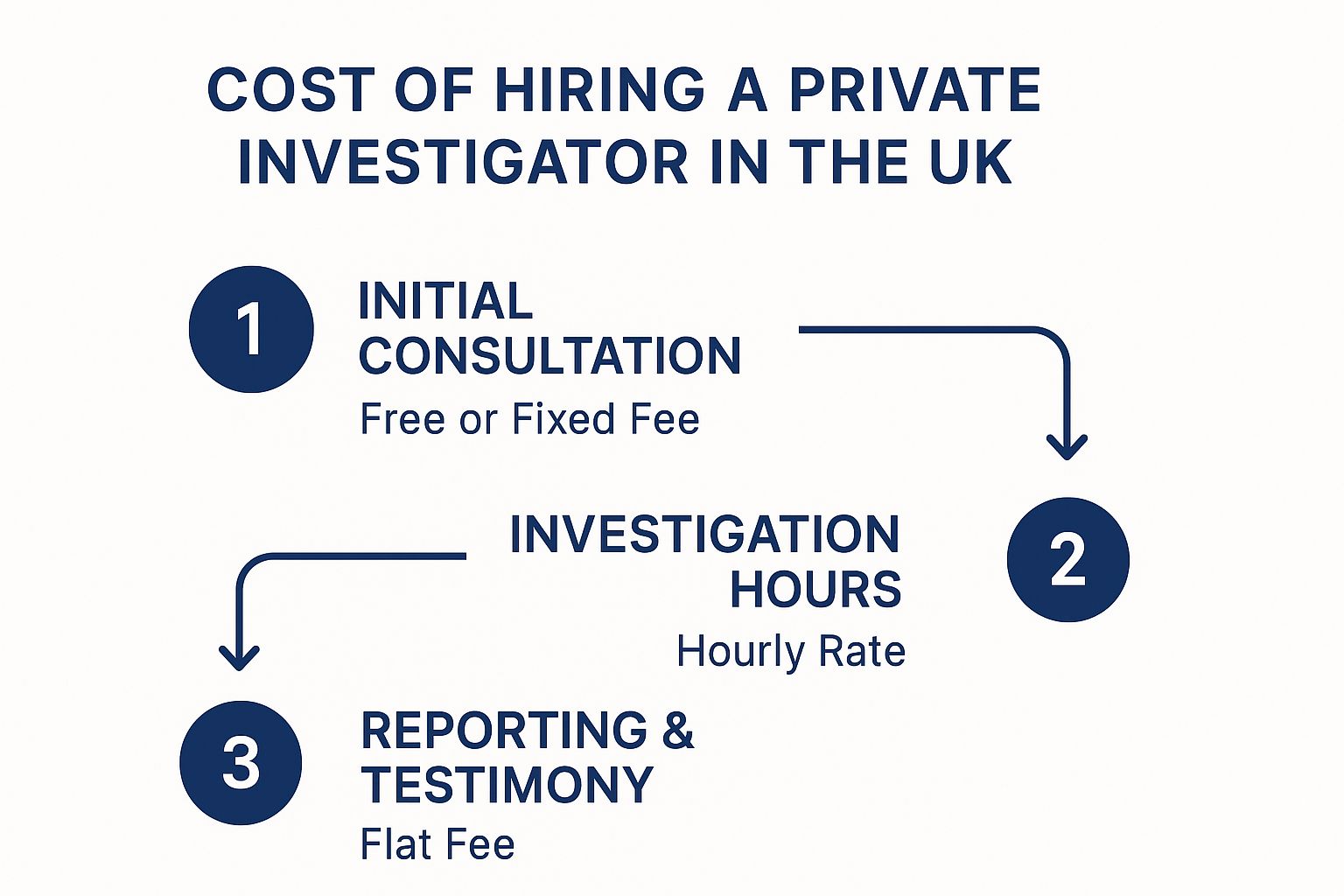Private Investigator UK: Expert Detective Services You Can Trust
- Showix technical Team
- Jun 17, 2025
- 12 min read
Updated: Jul 28, 2025
Understanding The Private Investigation World in Britain
Imagine a world less like Sherlock Holmes and more like a digital puzzle solver. That's the reality of private investigation in the UK today. It's a field evolving rapidly, moving away from the stereotypical image of trench coats and magnifying glasses. Modern private investigators are just as likely to be analysing data and online activity as they are conducting traditional surveillance.
This shift reflects the changing needs of clients and the increasing complexity of modern investigations. The field now attracts professionals from diverse backgrounds, including former police, military personnel, and tech experts. They bring a range of skills, utilising advanced technology and social media analysis to uncover information. And this demand for their expertise is only growing.
Beyond Infidelity: The Expanding Scope of Investigations
While matrimonial cases still exist, private investigation services now encompass a much broader range. Think of businesses facing intricate fraud schemes, families searching for missing loved ones, or individuals needing thorough background checks. These are all situations where a private investigator can provide crucial support.
For instance, a business might hire an investigator to look into employee misconduct or the theft of intellectual property. A family might need help tracing a relative they've lost contact with. These varied needs contribute to the significant growth seen in the industry. As of 2025, the Investigation Services sector, including both corporate and private investigations, has reached a market size of £191.5 million. This growth is a direct reflection of the increasingly complex world we live in. Learn more about the evolving landscape of the private investigation industry here: Private Investigation Industry in the UK.
Regulation and Professional Standards
A key aspect of the UK's private investigation sector is its largely unregulated nature. This means there isn't a mandatory licensing system or standardised training required to operate. However, organisations like The Association of British Investigators (ABI) play a vital role. They set standards and promote best practices within the industry. The image below shows a snapshot of the ABI website, highlighting their commitment to ethical conduct.
The ABI's influence underscores the importance of choosing a reputable investigator who adheres to professional guidelines. Even without strict government oversight, these self-regulatory efforts help ensure investigators operate ethically and legally. If you're curious to learn more about the role a private investigator plays in today's cases, take a look at our helpful guide: Understanding the Role of a Private Investigator in Modern Cases. Understanding the legal framework and the role of professional bodies like the ABI is essential for navigating the world of private investigation in Britain.This knowledge helps you make informed choices when considering engaging a private investigator.
What Can UK Private Investigators Actually Do For You?
Forget the Hollywood image of a trench-coat-clad figure lurking in shadows. The reality of private investigation in the UK is far more grounded and, frankly, more interesting. Think of a PI as a specialised problem-solver, someone who finds answers when all other avenues have been exhausted. They’re the people you turn to when your solicitor needs more evidence, your insurance claim has stalled, or someone has disappeared with vital assets.
A Wider Range of Services Than You Might Think
While matrimonial cases are still common, a PI's expertise extends far beyond relationship issues. Imagine a missing person scenario. A private investigator can access databases and employ techniques unavailable to the public, dramatically increasing the chances of finding the individual.
Think about the depth of a professional background check conducted by a PI. It’s not just a quick online search. It’s a deep dive into financial history, employment records, and even social connections, creating a comprehensive profile.
Let's look at some common services and their applications in more detail:
To help illustrate this, the table below outlines common private investigation services, their typical use cases, expected durations, and the types of evidence they might gather.
Service Type | Common Use Cases | Typical Duration | Evidence Types |
|---|---|---|---|
Background Checks | Pre-employment screening, Due diligence, Tenant verification | 1-2 weeks | Financial records, Employment history, Criminal records, Social media activity |
Surveillance | Infidelity investigations, Corporate espionage, Insurance fraud | Variable, days to weeks | Photos, Videos, Time-stamped logs |
Missing Person Investigations | Locating missing family members, Finding debtors | Variable, depends on complexity | Database searches, Interviews, Physical evidence |
Asset Tracing | Locating hidden assets in divorce cases, Recovering stolen property | Weeks to months | Financial records, Property records, Legal documents |
Fraud Investigations | Investigating internal theft, Insurance fraud, Investment scams | Weeks to months | Financial records, Interviews, Digital evidence |
As you can see, the services offered by private investigators are diverse and can be adapted to various situations. The duration and evidence types will vary depending on the specific case.
Supporting Businesses and Corporations
Private investigators are also invaluable assets for businesses. They conduct due diligence before significant investments, helping companies avoid costly mistakes. They investigate suspected internal fraud, protecting a company's bottom line. And they perform asset tracing, helping recover hidden or stolen funds. These services offer vital protection and peace of mind in today's complex commercial world.
The Value of a Professional Investigator
The real value of a PI isn't just about accessing information – it's about gathering legally admissible evidence. This is paramount for legal proceedings. They conduct inquiries discreetly, protecting sensitive information and avoiding tipping off the subject of the investigation. They then present their findings clearly, providing clients with actionable steps. This combination of discretion, legal expertise, and clear communication is what sets a professional investigator apart. They are the key to uncovering the truth while adhering to strict legal and ethical guidelines.
Legal Boundaries: What Your Investigator Can And Cannot Do
Let's talk about private investigators in the UK. There's a lot of mystique surrounding the profession, thanks to movies and television. But the reality is quite different. Forget the dramatic raids and secret access to confidential files – UK private investigators operate under the same laws as everyone else. They don't have any special powers.
Operating Within the Law
Interestingly, the UK doesn't have the strict licensing and regulation you see in some other countries for private investigators. There's no mandatory training or central governing body overseeing the industry. This doesn't mean it's a free-for-all, though. Investigators still have to follow the law, especially when it comes to data protection and surveillance.
Think of it like this: imagine playing a game of chess. You have a range of possible moves, but you're restricted by the rules of the game. Private investigators operate similarly. They have to be clever and resourceful within the existing legal framework. For example, the General Data Protection Regulation (GDPR) and the Data Protection Act set strict rules on how they can collect and use personal information. These rules place limitations on data collection without consent and mandate secure storage of sensitive data. Even something like fire safety comes into play. A responsible investigator needs to be aware of fire safety protocols during an investigation. You can find a helpful fire safety inspection checklist online to get a better understanding of these requirements.
The Importance of Expertise
So, what makes a professional private investigator effective? It's their expert knowledge of the system. They understand the legal limits and find creative ways to work within them. They're skilled at finding publicly available information, using lawful surveillance techniques, and gathering evidence that will hold up in court. It’s estimated that there are around 10,000 private investigators working in the UK, though this number is often debated. The Association of British Investigators (ABI), established way back in 1913, provides professional standards and support in this largely unregulated field.
Knowledge is Power
The real difference between a professional and an amateur isn't about special legal privileges. It's about knowing the rules of the game inside and out. Professional investigators get results because they know how to get the most out of legally permissible methods. They're experts at gathering evidence that will be admissible in court, making their work genuinely valuable in legal proceedings. This knowledge enables them to navigate difficult situations with skill and efficiency, obtaining information legally and effectively.
Understanding Investigation Costs: What You'll Actually Pay
Let's talk money. Nobody enjoys unexpected costs, especially when dealing with a stressful situation that requires a private investigator in the UK. The truth is, the price tag on these services can vary quite a bit. It's a bit like hiring a builder: patching a small hole in the wall is one thing, but a full-blown kitchen renovation is a whole different story. Investigations are similar.

Hourly Rates and Beyond
Many UK private investigators charge by the hour. These hourly rates can start as low as £25 for simpler tasks and climb to £200 or more for specialised skills. Investigators with extensive experience, like former police officers, often charge more. Location plays a role, too. Investigators based in London typically have higher rates than those elsewhere. For a deeper dive into the factors affecting investigator costs, take a look at this helpful resource: How Much Does a Private Investigator Cost? Key Factors in 2025. It’s also important to remember the legal side of things. Understanding the privacy policy of any service you're considering is crucial.
Fixed Fees and Hidden Costs
Although hourly rates are common, some investigators offer fixed-fee packages for common services. Think basic background checks or a set amount of surveillance time. However, it's the extra costs that sometimes catch people off guard. These can include things like travel expenses, which can really add up if surveillance involves tracking someone across the country. There might also be costs for specialised equipment if the case requires complex technical surveillance.
Unforeseen Circumstances and Expenses
The nature of investigations is unpredictable. A case that appears straightforward at the beginning can quickly become more complicated, demanding more time and resources. Let's say you suspect a spouse of infidelity. At first glance, it might seem like a simple case. But imagine the subject begins using counter-surveillance techniques or suddenly travels out of town. These unexpected turns of events can impact the final cost.
Transparency and Communication
The best way to avoid bill shock is clear communication. Before hiring anyone, ask detailed questions about all potential costs. A reputable investigator will openly explain their pricing and discuss any possible additional expenses upfront. This transparency allows you to plan your budget accordingly and avoids any nasty surprises later on. A solid understanding of the potential costs, both upfront and down the line, empowers you to make informed decisions throughout the investigation.
To help illustrate the potential costs involved, let’s take a look at a typical cost breakdown:
Private Investigation Cost Breakdown in the UK
Detailed pricing information for different types of investigation services and factors affecting costs
Service Category | Hourly Rate Range | Typical Total Cost | Additional Expenses |
|---|---|---|---|
Surveillance | £50 - £150 | £500 - £2,000+ | Travel, equipment rental |
Background Checks | £30 - £80 | £200 - £500 | Database access fees |
Locating Missing Persons | £40 - £100 | £300 - £1,000+ | Travel, search resources |
Corporate Investigations | £75 - £200 | £1,000 - £5,000+ | Legal consultation, expert witnesses |
As this table shows, the overall cost can fluctuate greatly depending on the complexity and duration of the service required. Additional expenses can significantly impact the final bill, so it’s crucial to discuss these possibilities with your investigator beforehand.
Choosing Your Investigator: Beyond Google Searches
Finding the right private investigator in the UK can feel like navigating a maze. It's a crucial decision, much like choosing the right surgeon. You need someone skilled, trustworthy, and with the right experience for your particular situation. The challenge is that, unlike regulated professions, the world of private investigation lacks standardised qualifications, making direct comparisons tricky. So, how do you cut through the noise and find a true professional?
Professional Affiliations and Relevant Experience
A good starting point is to look for investigators affiliated with professional organisations like the Association of British Investigators (ABI) or the Institute of Professional Investigators (IPI). Membership in these groups suggests a commitment to certain standards and continued professional development. Think of it like checking if a tradesperson is part of a recognised guild – it's not a foolproof guarantee, but it's a positive indicator. While membership is helpful, it's not the whole story. You also want to look for relevant experience. For further guidance, consider checking out this helpful resource: How to Hire a Private Detective UK: Your Essential Guide.
Imagine you need an investigator to handle a complex corporate fraud case. An investigator specialising in matrimonial disputes, no matter how experienced, might not be the best fit. Conversely, someone who excels at finding missing persons might not have the digital forensic skills needed for a cybercrime investigation. Matching the investigator's expertise to your specific needs is paramount.
The Initial Consultation: A Crucial First Step
The initial consultation is your chance to "interview" potential investigators. Pay attention to how they approach your situation. A true professional will ask detailed questions, clearly explain any legal limitations, and offer realistic timelines and cost estimates. Transparency is essential. Be wary of anyone promising guaranteed results – this can be a red flag. A good investigator will level with you about the potential challenges and uncertainties involved.
Communication, Trust, and Professionalism
Ultimately, trust your instincts. You'll be sharing sensitive information, so open communication and a professional demeanour are vital. Do you feel comfortable with this person? Do they inspire confidence? A good investigator will put you at ease and assure you that your case will be handled discreetly and effectively.
The UK Investigation Services Industry Landscape
The UK's Investigation Services industry is a significant market, encompassing both corporate and private investigation work. It reached a market size of £191.5 million in 2025. With 1,302 businesses operating as of 2024, the field is quite competitive. Large firms like Freshfields Bruckhaus Deringer LLP, Clifford Chance LLP, and Kroll LLC are part of this landscape. You can learn more about the scope of the industry here: UK investigation services market. This data underscores the importance of selecting a reputable and qualified investigator. Your choice directly impacts the outcome of your case. Invest the time to ask the right questions and make an informed decision.

What To Expect During Your Investigation Journey
Stepping into the world of professional investigations can feel daunting. This guide breaks down the process, from the initial contact to the final report, to give you a clearer picture of what to expect. Think of it as a partnership where open communication and realistic expectations are essential for the best results.
The Initial Consultation: Getting to Know You
Your journey starts with a consultation, usually over the phone or face-to-face. This is your chance to share your situation openly. The investigator will ask questions to understand your needs, similar to a doctor understanding your medical history. They’ll want to know about timelines, the people involved, any steps you’ve already taken, and what you hope to achieve. Good private investigators in the UK are skilled listeners, making sure they have all the facts before creating a plan.
The Contract: Setting the Boundaries
If you decide to move forward, a contract makes it official. This document sets out the investigation's scope, estimated costs, how communication will happen, and confidentiality agreements. This isn't just paperwork; it protects you from unexpected costs or changes in the investigation's direction. It ensures everyone is on the same page, protecting both you and the investigator.
The Active Investigation Phase: Staying in the Loop
Throughout the investigation, professional investigators keep you informed without compromising their work. They’ll provide updates on progress, challenges they encounter, and any adjustments to timelines or costs. Think of an investigation as a maze – some paths lead to quick solutions, while others require patience and persistence.

The infographic above shows the typical cost breakdown of a private investigation. It highlights the initial consultation (often free or a set fee), the investigation hours (billed hourly), and the final report and any potential testimony (usually a flat fee). The time spent on the investigation itself is the main cost, while the initial consultation and final report are generally predictable expenses.
Reporting and Conclusion: Getting Your Answers
The final step is a comprehensive report detailing the investigator’s findings. This can be a detailed written document for legal purposes or a concise summary for personal use. The format is tailored to your needs, ensuring the information is presented clearly and practically. This allows you to make informed decisions based on the evidence. Whether the outcome confirms your suspicions or reveals something unexpected, the final report provides clarity and closure.
Making The Right Decision: When To Hire Professional Help
Sometimes, finding answers is like a quick online search – a few clicks and you're done. Other times, it's more like a complex puzzle, demanding more than just a casual glance. Knowing the difference, knowing when to tackle the search yourself and when to call in a private investigator in the UK, can save you precious time, money, and a whole lot of headaches.
When a Private Investigator Is the Right Call
Think of it like this: if you've lost your keys, you'd search your house before calling a locksmith. But if you suspect a break-in, you'd likely call the police right away. Similarly, while some information can be found through simple online searches or directory inquiries, more complex situations, especially those with potential legal ramifications, benefit from the skills of a private investigator. Suspecting a partner of infidelity or needing to verify someone's background are prime examples. These scenarios often demand discreet, professional handling and the ability to gather admissible evidence. Reconnecting with an old friend, on the other hand, is likely best handled through social media or online directories.
Safety First: Don't Underestimate the Risks
Some investigations can be inherently risky. Imagine trying to track someone who's actively avoiding contact or investigating a potentially fraudulent business. These situations can put you in uncomfortable, even dangerous, positions. Professional investigators are trained to handle such scenarios, understanding the legal boundaries and employing methods to minimise risks to both themselves and their clients. They know how to gather information discreetly and safely, something a DIY approach can rarely guarantee.
Budget Considerations: The True Cost of DIY
While hiring a private investigator does involve an upfront cost, consider the potential hidden costs of a DIY investigation. Time spent chasing dead ends, the risk of alerting the person you’re investigating, or even accidentally compromising crucial evidence - these can be significant setbacks. Sometimes, the most cost-effective approach is to engage a professional from the outset, avoiding wasted time and potential damage to your case.
Weighing Your Options
Just like you wouldn’t attempt major home repairs yourself if you lack the expertise, certain investigations require a professional touch. A simple online search can answer basic questions. But for complex situations, particularly those with legal or safety implications, a private investigator in the UK brings experience, specialised knowledge, and resources to the table. Recognising when to bring in a professional is often the key to a successful outcome.
Ready to discuss your situation with a professional? Contact Sentry Private Investigators Ltd today for a confidential consultation.




